Bob Tallent,
Thursday 19th January @ 4.30pm
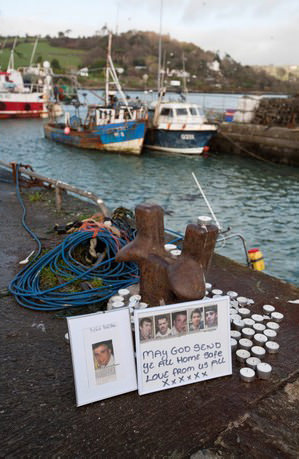 With the recent shipping catastrophes – in Ireland, twin rig trawler Tit Bonhomme and in Italy cruise liner Costa Concordia – I got to thinking about sea disasters, the captains, the owners and the drowned.
With the recent shipping catastrophes – in Ireland, twin rig trawler Tit Bonhomme and in Italy cruise liner Costa Concordia – I got to thinking about sea disasters, the captains, the owners and the drowned.
The Tit Bonhomme sank on Sunday morning close to Glandore Harbour. Its position and the foul weather have hampered the search for bodies. The coastguard is co-ordinating the search, which includes dive teams, teams on the shore, trawlers outside and inside the harbour, helicopters from Shannon and Waterford and many smaller boats and kayaks checking dozens of narrow, isolated coves. The search expanded to include inaccessible caves and a Civil Defence heights specialist crew of six conducted the first abseiling mission down a 50ft drop.
Egyptian crewman Mohammed Add Elgwad (40) survived. Today, divers recovered the bodies of 21-year-old Kevin Kershaw and 26-year-old Attia Shaban.
The Tit Bonhomme's skipper Michael Hayes, 52, and Egyptians Wael Mohammed and Saied Ali Eldin are still missing.
Kevin Kershaw from Dublin, was on his first outing as a fisherman. He had taken up a new role as a fisherman in a bid to make enough money to emigrate to Australia and had only joined the Union Hall based trawler Tit Bonhomme at the weekend when disaster struck. Mr Shaban had been in Ireland for two years and had recently moved to Skibbereen, from Union Hall.
The residents of west Cork’s Union Hall have been wonderfully supportive, providing food, drinks, beds and showers, as well as phones and computers for the relatives and rescue teams.
Unlike Capt Francesco Schettino of the Costa Concordia, Michael Hayes went down with his ship. The search for his body continues. It appears that Capt Schettino was one of the first people off his vessel although he claims he tripped and fell into a lifeboat while co-ordinating the evacuation and could not get back on the ship. In a damning recording of a phone conversation between him and an extremely irate coast guard officer, the latter insists Schettino return to the ship and the captain refuses. Schettino is now under house arrest and under investigation for manslaughter.
There are four things to know about maritime disasters:
- Ships sink regularly
The wreck of the Costa Concordia is an extraordinary example of either technological failure or human error. Indeed, while the investigation is ongoing, the early reports aren’t good for Capt Schettino because he disembarked before all passengers left. While a disaster on this scale is rare, ships sink all the time. John Konrad, a former ship captain who writes about maritime technology, says a ship sinks about once a week on average. Most aren’t reported because they’re not disasters on the scale of the Costa Concordia. - Modern ships can be low-tech.
GPS, radar, satellite communications, equipment sensors, and computerised monitoring are all commonplace now. Yet right now, only about 10 per cent of ships have internet service, which hinders ship-to-ship communication. That’s because the price of high-speed internet via satellite is about $15,000 per ship, though that figure is coming down. New radar technology is making its way onto ships, but most mariners are still staring at old-fashioned black-and-green radar set. - Disasters like the Concordia are not as common as they used to be.
The ship’s survivors compared their experience of the ship listing and panic taking over to the sinking of the Titanic. Three enormous changes have taken place in the 100 years since Titanic went down:- Ships can come to the rescue more quickly: After the Titanic, the US Coast Guard created the Automated Mutual Assistance Vessel Rescue System, which tracks commercial ships around the world, and there are few places left that a rescue boat couldn’t reach within a day.
- Ships are far more technologically sophisticated in 2012.
- There aren’t as many people at sea anymore. In Titanic’s day, ships were the way to travel the world. Today, there are fewer ships on the seas and cruise liners like the Concordia stick primarily to safe areas like the Caribbean and Mediterranean rather than the harsh North Atlantic.
- People still matter
A person still has to be in charge. No matter how far technology advances, you need a human in charge who knows what to do, especially when something goes wrong. Capt Schettino has been accused of serious negligence. However, it’s the normal interplay of crew and computer systems that’s worrying.It takes more time to develop the human element than to develop new systems. A $1 billion ship can be built in a year, but developing a $1 million captain to pilot that ship takes 10 years.
The evacuation of the Concordia has been compared with the Titanic disaster. Swiss survivors even told La Tribune de Genève newspaper that Celine Dion’s My Heart Will Go On, theme song to the 1997 film Titanic, was playing in their dining room as the cruise liner hit the rocks. In response to reporters, Capt Schettino claimed he and his crew were the last to leave the stricken vessel, which had around 4,200 people aboard. We all know now that this is untrue.
Five Concordia passengers have been confirmed dead and 20 more are still missing.
Schettino has cited incorrect information on nautical charts for the accident. But then he seems to have contradicted himself by reportedly telling the investigating judge in the city of Grosseto that he had sailed close to the island of Giglio to salute a former captain who lived on the Tuscan island: “I was navigating by sight because I knew the depths well and I had done this manoeuvre three or four times,” he allegedly said.
Meanwhile, satellite tracking information by the shipping journal Lloyd’s List Intelligence shows the Costa Concordia had sailed even closer to the island on a cruise last August. Lloyd’s List said the vessel passed within 230m of the island on August 14 last to mark La Notte di San Lorenzo – the night of the island’s shooting stars festival. And the route deviation had apparently been authorised by Costa Crociere.
Richard Meade, editor of Lloyd’s List, said: “The company’s account of what happened, of the rogue master [Capt Schettino] taking a bad decision, isn’t quite as black and white as they presented originally. This ship took a very similar route only a few months previously and the master would have known that.”
This saga continues. People are dead. The search for bodies continues. The cruise industry will not get off lightly.
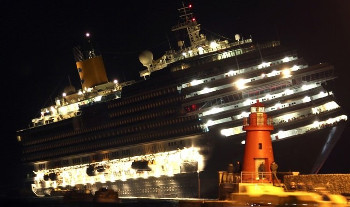 | 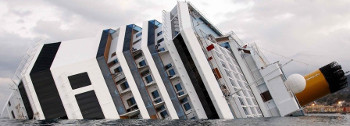 |
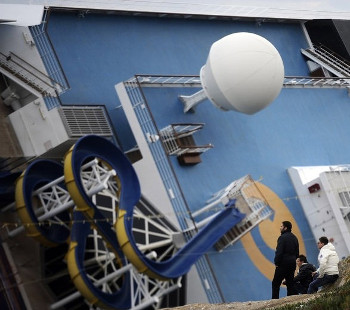 | 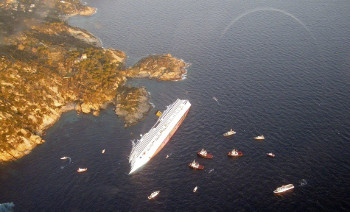 |
Copyright © 2011, DPNLIVE – All Rights Reserved




































































































